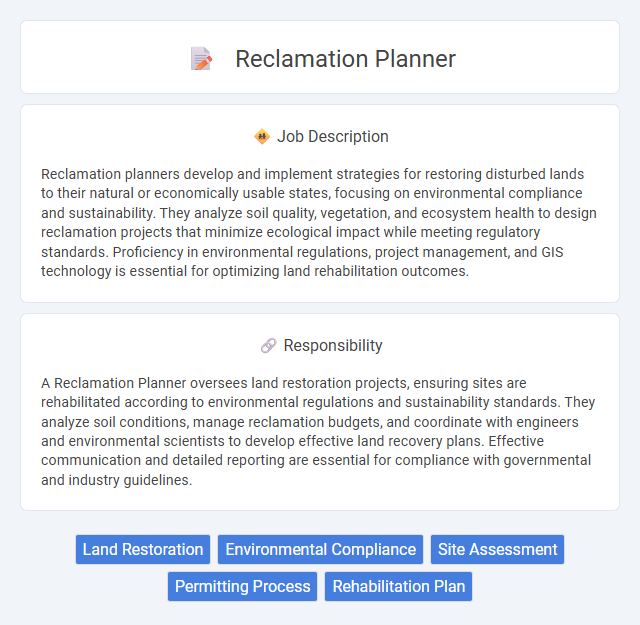
Reclamation planners develop and implement strategies for restoring disturbed lands to their natural or economically usable states, focusing on environmental compliance and sustainability. They analyze soil quality, vegetation, and ecosystem health to design reclamation projects that minimize ecological impact while meeting regulatory standards. Proficiency in environmental regulations, project management, and GIS technology is essential for optimizing land rehabilitation outcomes.
Individuals with strong analytical skills and attention to detail are likely suitable for a Reclamation Planner role, as the job often requires assessing environmental data and developing site restoration plans. Those who are comfortable working with regulatory frameworks and enjoy coordinating with multidisciplinary teams may have a higher probability of thriving in this position. However, people who prefer less structured tasks or who struggle with long-term project management might find this role challenging.
Qualification
A Reclamation Planner typically requires a bachelor's degree in environmental science, engineering, or natural resource management, combined with experience in land reclamation and environmental regulations. Proficiency in project management software, environmental impact assessments, and knowledge of government reclamation policies is crucial. Strong analytical skills and the ability to develop detailed site rehabilitation plans ensure successful restoration and compliance with environmental standards.
Responsibility
A Reclamation Planner oversees land restoration projects, ensuring sites are rehabilitated according to environmental regulations and sustainability standards. They analyze soil conditions, manage reclamation budgets, and coordinate with engineers and environmental scientists to develop effective land recovery plans. Effective communication and detailed reporting are essential for compliance with governmental and industry guidelines.
Benefit
A Reclamation Planner likely offers significant benefits such as enhanced project efficiency and regulatory compliance by strategically managing land restoration activities. This role may improve environmental sustainability outcomes, which can boost a company's reputation and reduce long-term liabilities. Employers might also benefit from cost savings through optimized resource allocation and minimized environmental penalties.
Challenge
The role of a Reclamation Planner likely involves significant challenges related to balancing environmental restoration goals with regulatory compliance and budget constraints. It probably requires addressing complex site conditions and unpredictable factors such as soil quality and ecosystem recovery rates. Navigating these uncertainties demands adaptive planning and continuous coordination with multiple stakeholders to ensure successful reclamation outcomes.
Career Advancement
A Reclamation Planner plays a crucial role in environmental restoration projects by developing detailed plans for land rehabilitation and resource recovery. Career advancement opportunities in this field often lead to senior environmental consultant roles, project management positions, or specialized expertise in sustainability and regulatory compliance. Gaining certifications such as Certified Reclamation Professional (CRP) and experience with Geographic Information System (GIS) software can significantly enhance prospects for leadership and strategic planning roles.
Key Terms
Land Restoration
A Reclamation Planner specializes in developing and implementing strategies for land restoration after industrial, mining, or construction activities. This role involves assessing disturbed sites, preparing detailed reclamation plans, and ensuring compliance with environmental regulations to restore ecosystems and promote sustainable land use. Expertise in soil science, erosion control, native vegetation planting, and regulatory frameworks is essential for successful land rehabilitation projects.
Environmental Compliance
Reclamation Planners specialize in developing and implementing strategies to restore disturbed land to its natural or economically usable condition, ensuring strict adherence to environmental compliance regulations such as the Clean Water Act and local reclamation policies. They conduct site assessments, prepare regulatory documentation, and coordinate with environmental agencies to meet permit requirements and minimize ecological impact. Expertise in soil stabilization, vegetation reestablishment, and habitat restoration is critical to optimize land recovery and support sustainable environmental management practices.
Site Assessment
Reclamation Planners conduct thorough site assessments to evaluate environmental conditions and identify areas requiring remediation or restoration. They analyze soil, water, and vegetation samples to determine contamination levels and develop detailed reports guiding reclamation strategies. Accurate site assessment data ensures compliance with environmental regulations and supports sustainable land use planning.
Permitting Process
Reclamation Planners specialize in coordinating the permitting process to ensure compliance with environmental regulations and land restoration requirements. They collaborate with regulatory agencies to obtain necessary permits, conduct environmental impact assessments, and prepare detailed reclamation plans that align with legal standards. Their expertise in navigating complex regulatory frameworks accelerates project approvals and supports sustainable land use post-extraction.
Rehabilitation Plan
A Reclamation Planner specializes in developing detailed Rehabilitation Plans to restore disturbed land to its natural or economically usable state, ensuring compliance with environmental regulations and sustainability goals. The plan typically includes site assessment, soil stabilization techniques, vegetation selection, erosion control measures, and monitoring protocols to guarantee successful land recovery. Effective Rehabilitation Plans balance ecological restoration with community and operational needs, optimizing timelines and resource allocation for post-mining or construction land reclamation projects.
 kuljobs.com
kuljobs.com